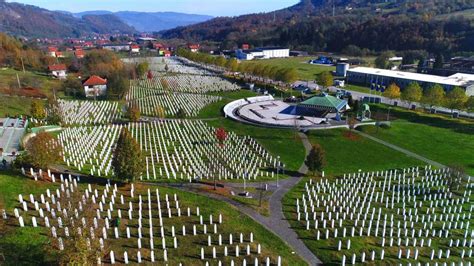
Bosnian director Jasmila Žbanić’s film Quo Vadis, Aida? has taken the world by storm and is nominated for several prestigious awards in the upcoming ceremonies, including the Best International Feature Film at the 93rd Academy Awards. Written, produced and directed by Žbanić, Quo Vadis, Aida? is also up for BAFTAs in the categories of best international film and best director.
“Quo Vadis, Aida? is a Bosnian war drama set in July 1995 around the Srebrenica massacre. Aida is a translator for the UN in the small town of Srebrenica. When the Serbian army takes over the town, her family is among the thousands of citizens looking for shelter in the UN camp. As an insider to the negotiations Aida has access to crucial information that she needs to interpret. What is on the horizon for her family and people – rescue or death? Which move should she take?”
The Srebrenica massacre (also known as the Srebrenica genocide) occurred over a matter of days in July 1995 whereby more than 8,000 Bosniak Muslim men and boys were killed en masse. The area in which this happened had been designated a ‘safe area’ by the United Nations, however the area was not in fact made safe by the UN, and the massacre unfolded regardless.

Speaking to the BBC about the film’s creation, Žbanić explained that nine European countries including Bosnia-Herzegovina funded the film:
“Bosnia doesn’t have a film industry. We produce around one film a year, with a budget of around €1m (£850,000). But this film, partly because of the extras we needed, would cost at least four times that and so had to be a co-production with other countries.
This is also a sensitive and painful topic, and as soon as we mentioned the word ‘genocide’, many people shied away, saying, ‘It’s too difficult.’ Now I think, no, it’s you who thinks an audience doesn’t want to see difficult things.”
Žbanić described her protagonist Aida as “a combination of many people we met or read about” and also credited being influenced by the book Under the UN Flag: The International Community and the Srebrenica Genocide by Hasan Nuhanović.
“For the first time here is a publicly available account of the terror and inhumanities experienced by those seeking sanctuary from genocide and placing their lives and their trust in the hands of the peace keepers. Unarmed, starved and deprived of basic humanitarian needs the people of the ‘safe haven’ of Srebrenica placed their complete reliance on the promise of protection by the United Nations The book is compiled from first hand experience of the events by Hasan himself as well as other survivors of the genocide. It provides a detailed chronology covering the days leading up to the notorious 7/11 when the genocide of Bosnian Muslims in Srebrenica began and the subsequent period during which the world media continued to propagate the message that nothing sinister was going on: it took the best part of six years before genocide was officially deemed to have taken place in 2001. This unique account is both an exhilarating read and a major point of historical reference.”
This is not the first work Žbanić has created that delved into troubling topics from Bosnia’s recent history – her first award-winning feature film Esma’s Secret: Grbavica from 2006, depicted the lead character as a single mother in modern-day Sarajevo, and told the story of widespread rape of these women by Serbian soldiers during the war.
“I was 17 when the war started so I didn’t have access to many sources. Later, I was told by many of my colleagues that I should be with my small child instead of working when I was making my first film.
They just tried to put this guilt on me. But now audiences and film crews are getting used to the idea of a woman directing. And with this film it shows the female gaze is really different in war, and a different mindset. For me, war can’t be sexy. I can’t find pleasure in framing this with my camera.”
Jasmila Žbanić on IMDB

Accessibility At The Smith Center Series: Part One
James “Fitz” FitzSimmons Interview: The Boys In The Band On Netflix


Michelle is a musician and composer from the UK. She has performed across the UK and Europe and is passionate about arts education and opportunities for women and girls.
Read Full Profile© 2021 TheatreArtLife. All rights reserved.

Thank you so much for reading, but you have now reached your free article limit for this month.
Our contributors are currently writing more articles for you to enjoy.
To keep reading, all you have to do is become a subscriber and then you can read unlimited articles anytime.
Your investment will help us continue to ignite connections across the globe in live entertainment and build this community for industry professionals.